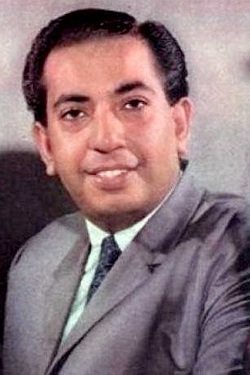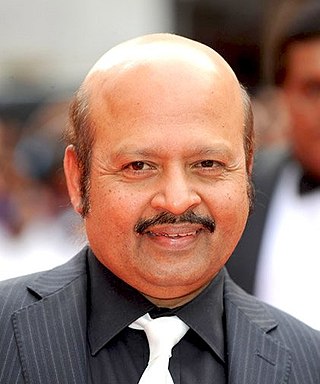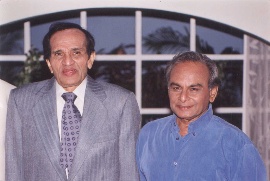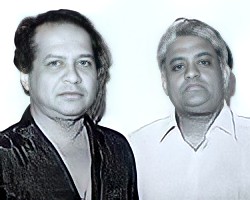| Year | Film | Film song lyricist | Songs and Notes |
|---|
| 1949 | Neki Aur Badi | Kidar Sharma | Roshan's first movie as a composer |
| 1950 | Bawre Nain [3] [4] | Kidar Sharma | Roshan's first breakthrough big hit song: "Khayaalo.n me.n kisiike" sung by Mukesh and Geeta Dutt |
| 1951 | Hum Log | Uddhav Kumar, Vishwamitra Adil | "bahe a.Nkhiyo.n se dhaar" sung by Lata Mangeshkar, "apni nazar se unki nazar tak" sung by Mukesh |
| 1951 | Malhar [3] | Kaif Irfani, Indeevar | "ba.De aramaano.n se rakhaa hai" sung by Lata Mangeshkar and Mukesh; "kahaa.N ho tum zaraa aawaaz do" sung by Lata Mangeshkar and Mukesh |
| 1952 | Anhonee | Ali Sardar Jafri, Shailendra | "mere dil kii dha.Dakan kyaa bole" sung by Lata Mangeshkar and Talat Mahmood |
| 1952 | Naubahar [3] | Meera Bai, Shailendra | "erii mai.n to prem diwani", a Meera bhajan sung by Lata Mangeshkar [3] |
| 1952 | Raagrang | Kaif Irfani, Pyarelal Santoshi, Sarshar Sailani, Prakash Bakshi | "dil-e-beqaraar so jaa" sung by Lata Mangeshkar and Talat Mehmood |
| 1952 | Sanskar | Shailendra | |
| 1952 | Shisham | Uddhav Kumar, Kaif Irfani, Zia Sarhadi, Nazim Panipati, Indeevar, Madhukar Rajasthani | "banaayii hai itanii ba.Dii jis ne duniyaa" sung by Lata Mangeshkar |
| 1953 | Aagosh | Shailendra, Indeevar, Kaif Irfani, Uddhav Kumar | "muhabbat ek sholaa hai" sung by Lata Mangeshkar |
| 1953 | Firdaus | D. N. Madhok, Shailendra | Some songs composed by Robin Chatterjee |
| 1953 | Gunah | Kidar Sharma | Some songs composed by Snehal Bhatkar |
| 1953 | Malkin | Rajendra Krishan | |
| 1953 | Mashuqa | Qamar Jalalabadi, Shailendra | "jhilamil taare" sung by Mukesh, "yeh sama hum tum jawaan", sung by Kishore Kumar and Meena Kappor |
| 1954 | Baap Beti | Kavi Pradeep | |
| 1954 | Baraati | Jan Nisar Akhtar, D.N. Madhok, Raja Mehdi Ali Khan, Tanvir Naqvi | |
| 1954 | Bhairavi | | Abandoned mid-way. Producer : Lata Mangeshkar for Surel Chitra. [9] "Kaahe Tarasaaye Jiyaraa" was recorded for this film but used in Chitralekha many years later |
| 1954 | Chandni Chowk | Majrooh Sultanpuri, Kamil Rashid, Shailendra, Raja Mehdi Ali Khan, Saifuddin Saif | "teraa dil kahaa.N hai" sung by Asha Bhosle |
| 1954 | Mehbooba | Tanveer Naqvi, Majrooh Sultanpuri, Indeevar | Some songs composed by O. P. Nayyar |
| 1955 | Chhora Chhori | Kidar Sharma, Himmat Rai Sharma, Noor Dewasi | |
| 1955 | Ghar Ghar Mein Diwali | Prem Dhawan, Indeevar | |
| 1955 | Jashan | Rajendra Krishan | |
| 1956 | Rangeen Raten | Kidar Sharma | |
| 1956 | Taksaal | Prem Dhawan | "dil bhii teraa, ham bhii tere" sung by Lata Mangeshkar |
| 1957 | Agra Road | Prem Dhawan, Bharat Vyas | |
| 1957 | Coffee House | Prem Dhawan, Shailendra, Hasrat Jaipuri | |
| 1957 | Do Roti | Khumar Barabankvi | |
| 1958 | Aji Bas Shukriya | Faruk Kaiser | "saarii saarii raat terii yaad sataae" sung by Lata Mangeshkar |
| 1958 | Raja Beta | Rajendra Krishan | |
| 1959 | Aangan | Rajendra Krishan, Avinash, Pandit Indra | |
| 1959 | CID Girl | Anand Bakshi, Hasrat Jaipuri | |
| 1959 | Deep Jalta Rahe | Shailendra, Rahil Gorakhpuri | |
| 1959 | Heera Moti | Shailendra, Prem Dhawan | |
| 1959 | Madhu | Shailendra, Naqsh Lyallpuri, Prem Dhawan | |
| 1959 | Maine Jeena Seekh Liya | Rahil Gorakhpuri, Anand Bakshi | "tere pyaar ko is tarah se bhulaanaa" sung by Mukesh |
| 1960 | Babar | Sahir Ludhianvi | "salaam-e-has_rat qabuul kar lo" sung by Sudha Malhotra |
| 1960 | Barsaat Ki Raat [4] [3] | Sahir Ludhianvi | The biggest musical film of his career with the most hits. [3] "zi.ndagii bhar nahii.n bhuulegii vo barasaat kii raat" sung by Mohammed Rafi as a solo and in a duet version with Lata Mangeshkar |
| 1961 | Warrant | Prem Dhawan, Anand Bakshi | |
| 1961 | Zindagi Aur Hum | Shiv Kumar Saroj, Veer Muhmmad Puri | "tuu ham ko dekh aur hamaarii nazar se dekh" sung by Lata Mangeshkar |
| 1962 | Aarti | Majrooh Sultanpuri | "aap ne yaad dilaayaa to mujhe yaad aayaa" sung by Rafi and Lata |
| 1962 | Soorat aur Seerat | Shailendra | |
| 1962 | Vallah Kya Baat Hai | Prem Dhawan, Anand Bakshi | |
| 1963 | Commercial Pilot Officer | Anand Bakshi | |
| 1963 | Dil Hi To Hai | Sahir Ludhianvi | "laagaa chunarii me.n daaG" sung by Manna Dey |
| 1963 | Taj Mahal [6] | Sahir Ludhianvi | Both the song "jo waadaa kiyaa vo nibhaanaa pa.Degaa" sung by Mohammed Rafi and Lata Mangeshkar and the film itself were "super hits" [5] [6] |
| 1964 | Chitralekha [10] | Sahir Ludhianvi | In 2006, the song "man re tuu kaahe na dhiir dhare" sung by Mohammed Rafi was chosen by a jury of professionals in the Indian film industry as the top number one Hindi song [10] |
| 1965 | Bedaag | Shakeel Badayuni, Anand Bakshi | |
| 1965 | Bheegi Raat | Majrooh Sultanpuri | "dil jo na kaha sakaa" in two versions, one each by Mohammed Rafi and Lata Mangeshkar |
| 1966 | Daadi Maa | Majrooh Sultanpuri | "usko nahin dekha hamne kabhi" - an ode to the mother, sung by Mahendra Kapoor and Manna Dey |
| 1965 | Nai Umar Ki Nai Fasl | Neeraj, Manmohan Tiwari | "caravan guzar gaya" ("swapna jhare phool se"), sung by Mohammad Rafi |
| 1966 | Devar | Anand Bakshi | |
| 1966 | Mamta | Majrooh Sultanpuri | "rahe.n na rahe.n ham" sung by Lata Mangeshkar, with a different version by Mohammed Rafi and Suman Kalyanpur |
| 1967 | Bahu Begum [11] | Sahir Ludhianvi | "ham intazaar kare.nge teraa qayaamat tak" sung by Asha Bhosle and Mohammed Rafi |
| 1967 | Noor Jehan | Shakeel Badayuni | "sharaabii sharaabii ye saawan kaa mausam" by Suman Kalyanpur |
| 1968 | Anokhi Raat | Indeevar, Kaifi Azmi | "oh re taal mile nadii ke jal me.n" sung by Mukesh |
| 1973 | Dur Nahin Manzil | Anjaan, Indeevar | Posthumous Release. Some songs composed by Shankar-Jaikishan |











